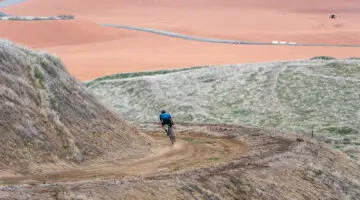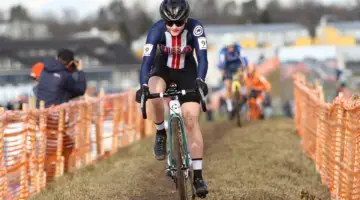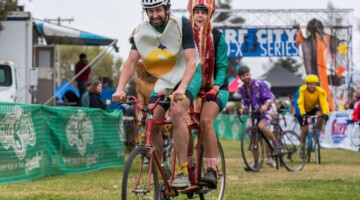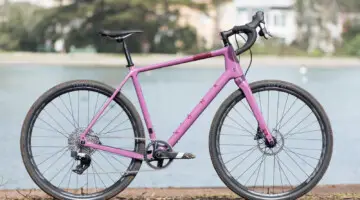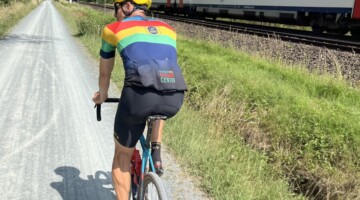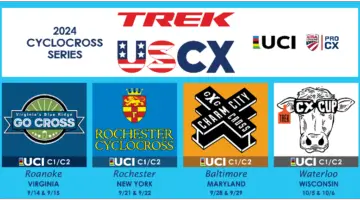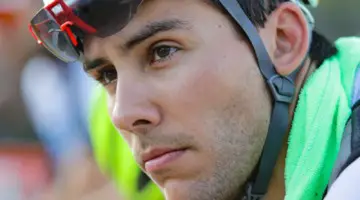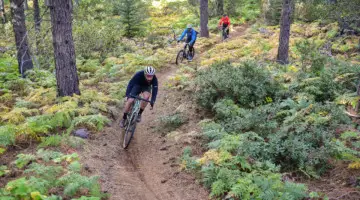The 2019 Rochester Cyclocross weekend in Upstate New York is less than two weekends away. As part of the weekend of racing and events, Rebecca Fahringer and Kerry Werner of the Kona Maxxis Shimano cyclocross team will be hosting a ’Cross Clinic on Friday, September 6 from 2:30 to 4:30 p.m.
With the course ready for the weekend of racing, Werner described the opportunity the Rochester clinic will present.
“I think it’s a pretty unique opportunity because in Rochester, participants will have the opportunity to ride a lap with us and ask questions about things they’re struggling with and soak it up like a sponge. Then they’ll be able to apply it the next day in a race setting.”
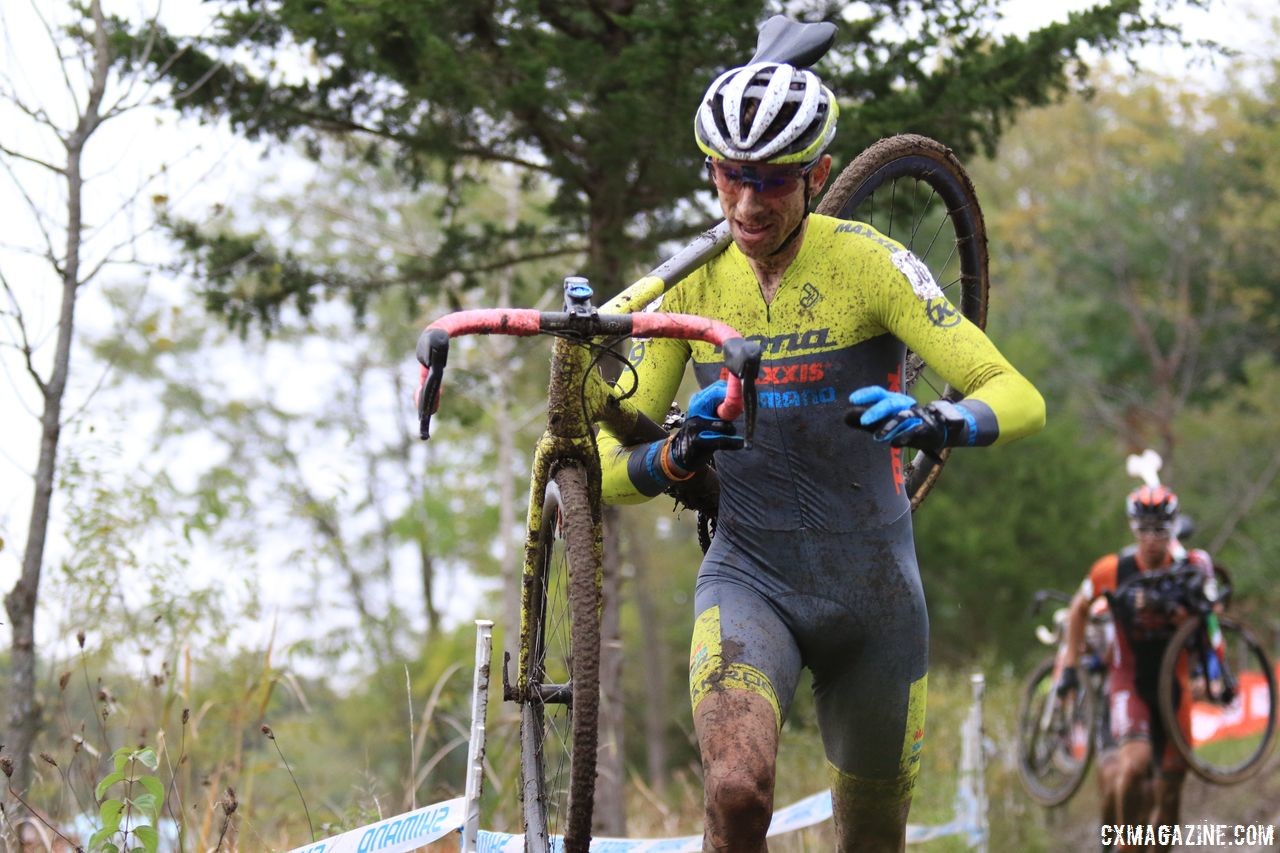
Kerry Werner will be helping put on a clinic at Rochester. 2018 Jingle Cross Day 3, Sunday. © D. Mable / Cyclocross Magazine
Fahringer hosted a clinic before last year’s race, and she said she is looking forward to the opportunity to use the course’s unique features as a chance to learn confidence and proper technique.
“Last year they put in that steep downhill with a little step in it, which was really intimidating. We spent some time building up confidence on that. Some of the loose downhill turns provide a chance to session them to get faster and work on more relaxed body positioning.”
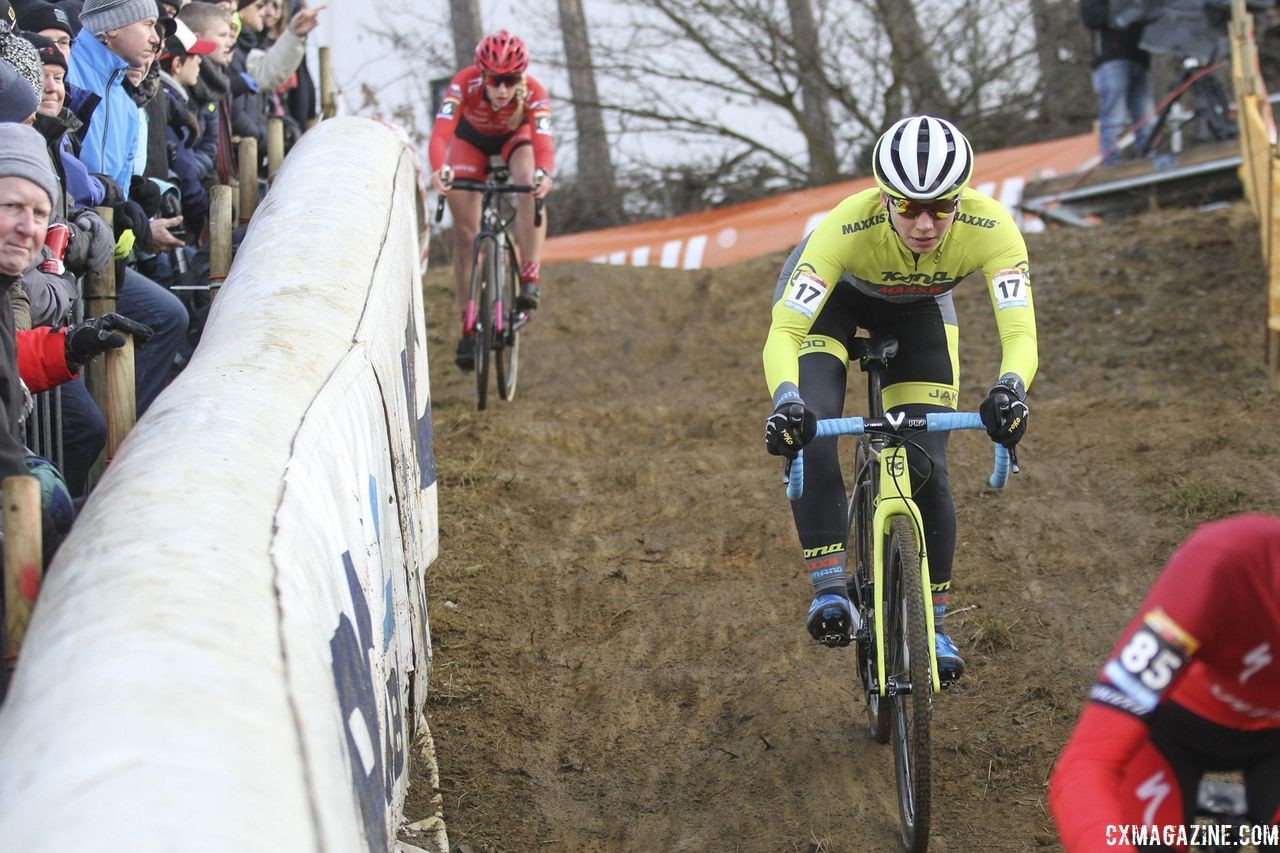
Rebecca Fahringer is back for a second year leading a cyclocross clinic in Rochester. 2018 World Cup Heusden-Zolder. © B. Hazen / Cyclocross Magazine
Another opportunity Fahringer and Werner are providing is the chance to ask them questions before the camp. Whether it be a specific question or something participants would like to see covered, they are welcoming feedback and input.
You can email shana [at] fullmoonvista [dot] com or reach Fahringer (Twitter, Instagram) or Werner (Twitter, Instagram) on social media.
The clinic costs $40 and registration is open through Thursday, September 5.
Click here to register for the Rochester ’Cross Clinic
To register for the weekend of amateur and UCI racing at the Rochester cyclocross weekend, visit bikereg.com. For more info about the clinic and the entire weekend, head over to rochestercyclocross.com.
We chatted with Fahringer and Werner to learn more about what to expect from the Rochester ’Cross Clinic and how they themselves improve as cyclocross racers. You can read a transcript of our conversation below.
Featured image: Dave Mable
Interview: Rebecca Fahringer and Kerry Werner on 2019 Rochester ’Cross Clinic
Cyclocross Magazine: What do you two enjoy about putting on cyclocross clinics?
Rebecca Fahringer: For me, I enjoy it because it’s a chance to connect with the local communities and meet friends throughout the country. Usually, I learn more doing the clinics than I feel like I teach. I felt the same way at Montana Cross Camp as well.
Kerry Werner: So this one time at Cross Camp, Becky learned more than the campers, that kind of thing?
That’s basically the same way I feel. We just did a cyclocross camp here in North Carolina, and it’s crazy how many people are stoked about ’cross and want to be involved but are new to a lot of the basic cyclocross skills. Just talking with people about remounting and other simple things can make a big impact on their enjoyment of the sport.
CXM: When I look at my own development, I think learning to turn my bike has been so important for my improvement as a rider. How do you teach those skills and do you have any tips for riders at different levels?
KW: When we just did this ‘cross clinic up in Banner Elk, it was really easy to help out the folks who were having some trouble cornering because there were some obvious things in their form. For example, a lot of people corner with flat feet or don’t have their outside foot down or their upper body position is not centered over the bike. A lot of that stuff is easier to teach.
It’s harder when, for instance, Lance Haidet shows up at a clinic; it would be harder for me to teach him new things.
RF: I like to help participants with what they’re looking at. My big issues are where my eyes are and when I’m braking. Looking for that in others, I feel I help myself, but also it’s something I can spot in others because it’s something I’m always thinking about.
CXM: What are some other skills you think you’ll be teaching at the Rochester clinic?
RF: I think the Rochester clinic will be very course-specific to that race. There are always a few elements in the course that aren’t something you might see at home. Last year they put in that steep downhill with a little step in it, which was really intimidating. We spent some time building up confidence on that. Some of the loose downhill turns provide a chance to session them to get faster and work on more relaxed body positioning.
KW: I think it’s a pretty unique opportunity because in Rochester, participants will have the opportunity to ride a lap with us and ask questions about things they’re struggling with and soak it up like a sponge. Then they’ll be able to apply it the next day in a race setting. I think that’s more helpful than something where you’re just working on general skills.
RF: Last year with the Rochester clinic, I opened up the option of sending me questions or things they would like to see me cover. To be honest, nobody took advantage of that, but I think we’ll do the same this year. We’re welcoming anyone who’s attending to submit a question ahead of time, and hopefully some folks will take advantage of that unique opportunity.
CXM: So they can @ you on social media?
RF: For sure. Or email us if you don’t want the world to know they’re asking. Or DM, or anything.
KW: Ooooo, so we can slide into Becky’s DMs?
RF: Yep, I’m opening the public to slide into my DMs and @ me.
CXM: You can always ask for a friend. We did that with our resident coach Chris Mayhew. “Asking for a friend,” but some of them may have been for my own benefit.
One thing that is cool about the two of your together, Becca your background was in triathlons while Kerry’s was in mountain biking. Do you think that affects the perspectives you guys have when teaching folks about the sport?
KW: I think it’s pretty relatable coming from different backgrounds. Another thing is Rebecca is a high-level ’cross rider who is a woman, and there are not a lot of high-level women putting on clinics like these. For example, at my camp, there were a handful of women who attended, and perhaps they would have felt a little more open to asking questions if we had a woman coaching at camp, so that’s a cool aspect of this clinic in Rochester. Especially because there are a lot of younger women coming into the sport.
CXM: Rebecca, you were just at Montana Cross Camp; how was that experience getting to work with a supportive group of 15 young women who also got the chance to learn from some of the best in the sport as coaches?
RF: I’ve said it a thousand times, I learned so much more at Cross Camp than I provided to the campers. It was also nice talking to Katie Compton and Allison Arensman, who have done other camps, about different camp experiences and teaching techniques. One cool thing about Montana was we got to ride with the campers instead of just standing there and dictating.
I think the more clinics that riders get to do, whether they’re participating or leading, it always provides unique experiences to carry forward to teach even more or be more open to learning new things. It’s not Montana Cross Camp specific, but I think every cyclocross camp or clinic leads to the betterment of your learning.
CXM: You guys are at the highest level of the sport, how do you figure out where folks are at and remember what it was like to learn those skills for the first time?
RF: I feel like I’m better at teaching people the really basic skills. I get really intimidated when I feel like people are at my level. Then I don’t know what else I can teach you.
KW: I agree. It’s way easier to teach newcomers who are basically a blank chalkboard than telling a really fast Junior who can remount and do all those things without a problem. It’s hard to tell how to improve any aspect of their rider.
RF: For instance, a lot of people have questions on turning, and for me, turning is so dependent on your own speed in the race, weight, whether you come from a road or mountain bike background; there’s no one way to turn.
CXM: How do you develop and learn?
KW: My main theory on trying to get better is you literally have to ride the ragged edge until the ragged edge becomes comfortable. It’s like a threshold thing where you’re comfortable at a certain level, and then you have to push that level or you’re just going to plateau. For me, I’m always trying to do new things, whether it’s trying to hit corners at different speeds or bunny hop higher stuff or trying to do things while I’m really gassed.
A lot of what I’ve learned has been from my experiences in Europe and watching those guys just demoralize me. It’s like, “How can I achieve that level of racing prowess?”
RF: I feel like I keep getting a little bit stronger and put a little bit more speed into various skills, and my confidence just continues to grow. With the growing confidence, I get smoother and can push more barriers. Sometimes it’s not like an active attempt, it just happens organically.
Plus, shredding the gnar gravel seems to be helping a lot of people in cyclocross right now.
CXM: Kerry, you talked about getting demoralized in Europe, and I think for all of people who are developing, that’s a challenge. You move up from Cat 4 to Cat 3 and see folks who are shredding you, and then you move from Cat 3 to 2 and it really sucks because you’re racing against the Elites. How have you been able to improve but stay positive?
KW: I think you have to have a certain mentality about it. You have to understand your circumstances, and it’s like, “Well, just because you’re good as a Cat 4, you’re going to face new challenges in Cat 3.” It’s the same idea with hitting a rut; if you hit a rut really comfortably when you’re fresh, you might not be as good at it when your heart rate is red-lined.
So if you’re winning Cat 4 races, you could sandbag, or you can have this idea that you want to get better and there are people who are better than you. Then you go and learn from them.
For me, I learn more in racing than I do in training because that’s when you’re on the limit and you’re figuring out what aspects of your riding are really lacking. I think it’s important to have an open mind. I wouldn’t look at it as getting beat as much as a stepping stone toward ruling the world.
CXM: So that’s the ultimate goal, ruling the world?
KW: Yes, for sure.
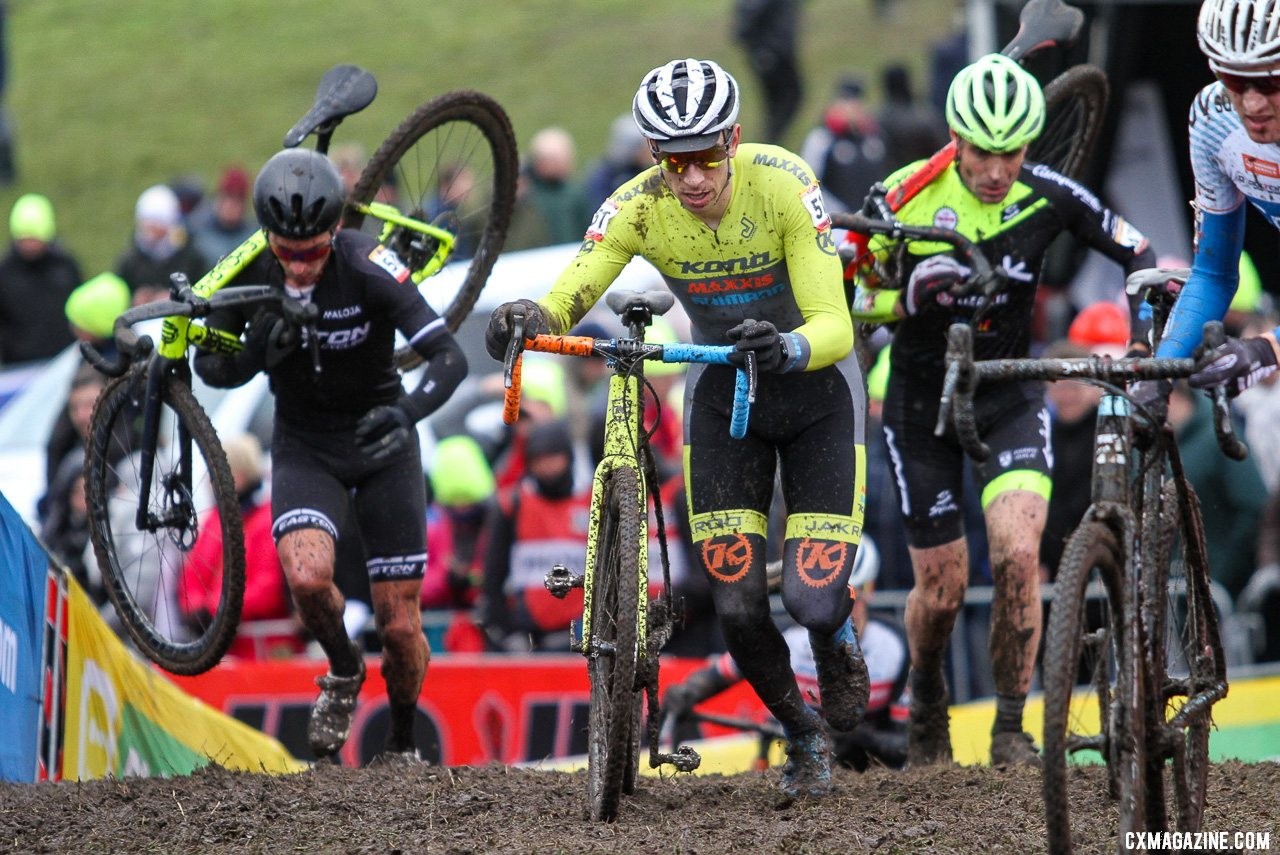
Kerry Werner said he’s learned a lot racing in Europe. Elite Men, 2019 Hoogerheide UCI Cyclocross World Cup. © B. Hazen / Cyclocross Magazine
CXM: Rebecca, at Montana Cross Camp you gave a really good presentation on the mental side of cyclocross. It was seriously really good. What are some easy things to do to handle the mental side of racing?
RF: It always depends on your level and what your individual goals are. As Kerry said, be realistic, whether that’s about your abilities or your goals. Have realistic expectations for your performance.
Also, deep breathing. That helps whether you’re anxious or you’re nervous, you’re excited, you’re out of breath. Take deep breaths and control your heart rate, knowing you’re in charge of your own body. You can practice this stuff all the time whether you’re in training or in a race.
KW: I breathe deep in every race. It’s something I’ve practiced.
RF: You’d be surprised by the number of people who forget to breathe.
CXM: I know you’re busy, so we’ll wrap up with one more question. One thing that is cool about cyclocross is there are a communal aspect and good vibes, in terms of finding friends and having others to push you, how have you two benefitted from being teammates?
KW: I think it’s been cool having Becky on the team. She’s not very serious, so she can put up with a lot of my sarcasm and stuff. With the whole mental aspect of racing ’cross, if everything is always uptight and there’s a lot of pressure, that can be a negative influence on somebody’s performance. I think it helps keep the mood the light and not take yourself seriously until you’re on the start line. Joking around with the Beccster helps me with that.
Plus her rendition of “Zombie” was a big hit last year.
RF: I agree. I do think that this year I should get Kerry to kick my butt in pre-ride a little bit more often, to try to stick his wheel when we’re out on the course.
CXM: Well cool, thanks your time Becca and Kerry. It’s always fun, and I’m looking forward to seeing you out teaching the Friday of the Rochester weekend.
RF: You bet, we’re both really stoked about it.
KW: Indeed we are. Looking forward to it.
This post is sponsored in part by Rochester Cyclocross.

